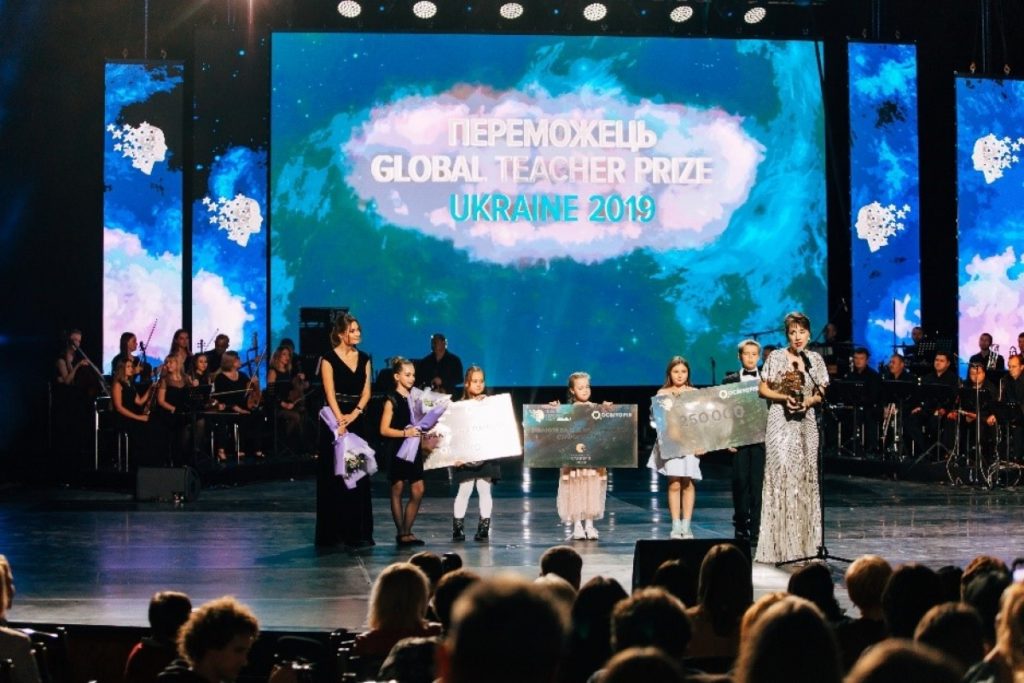EWC is proud to congratulate our Schools for Democracy trainer Natalia Kidalova on winning the Global Teacher Prize Ukraine 2019. Starting at 3000 candidates Natalia was announced as number one in Kyiv October 5th. Here, she talks about her many experiences working as a teacher for over two decades, and we get to hear about the school of her dreams.

Kidalova has been working with us since she participated at the Regional Summer Academy in Poland in 2012 and was a co-trainer at the very first Schools for Democracy training in 2015. In addition to being an EWC trainer and coordinator of the southern school hub, she is a dedicated teacher at school #23 in Melitopol in the Zaporizhzhya region of Ukraine.
Dear Nataliya, you have been working with the EWC since 2012. We are very proud to be cooperating with the best teacher in Ukraine! What do you value most in this cooperation?
I am glad to have been cooperating with the EWC. The Schools for Democracy Programme contributes to many important changes in education in my country, which I will be continuing to work on both in my school and in my capacity as programme trainer, and co-author of new resources for learning democracy.
You have been a teacher for 23 years; can you talk a little about how it is to be a teacher today?
I am a fourth-generation teacher and believe it is a privilege to be one. A modern teacher is active, not afraid of changes or making mistakes. I think the teacher is like a gardener. She never expects gratitude from the trees or flowers, and never blames them for growing slow, and knows that a rose needs different time for blossoming than a chrysanthemum. A good teacher always gives children time to open up and blossom.
You have been contributing to educating several generations now. How hard is it to work with students in the information age?
Today’s generations are more open, freer. Sometimes adults believe students are obliged to learn. But it is not true. Children has the right to education. And the school’s responsibility is to make learning interesting. Teachers must trust children. Yes, today the span of students’ attention is shrinking, children switch from one topic to the other in a blink of the eye, they know how to combine different things. This is good in the era of overwhelming information. But this does not mean they are “harder to work with”, this only means that teachers must keep on learning too, to make the teaching and learning process more suitable to today’s students. I’ve always learned from my students, this award is theirs, and I will keep the Global Teacher Prize Ukraine statute at school.
What is most important for you in teaching?
To embrace mistakes. This is something I teach my students, and that I am working on for myself as well. I want my students to learn from their failures, and to grow confident and believe in themselves. This self-confidence is for me the only criteria of students’ performance. Not grades.
When receiving the Prize at the National Opera House in Kyiv, you said: “Always be honest with yourself and never stop dreaming. I have always believed in miracles. This is magic – miracles become reality. And this is happening to me right now!”
What is the school of your dreams?
I’ve been working on introducing democratic practices in schools in Ukraine for years, and I see that they are changing; schools are becoming spaces where students can practice participation and teachers are encouraged to be creative. To me, this is not enough.
My big dream is to make school open for all – for teachers, for parents and grandparents, for the local community – so that anyone could come to school for a yoga training, reading a book, for a workshop or working on a computer. I dream that schools become hubs that push all in the local community to grow.